Unlock your car’s secrets with the Best Scanners For Cars, connecting to the onboard computer and granting access to vital information. Whether addressing a car problem or a mysterious dashboard light, the computer usually holds the key, and the right scanner acts as the intermediary, enabling self-diagnosis without expensive professional fees. At CAR-TOOL.EDU.VN, we provide detailed comparisons, specifications, and user reviews to help you find the perfect tool for your needs, ensuring accuracy and ease of use. Explore options like code readers, diagnostic tools, and car diagnostic scanners to keep your vehicle running smoothly.
Contents
- 1. Understanding Car Scanners and Their Importance
- 1.1. What is an OBD-II Scanner?
- 1.2. Why Use a Car Scanner?
- 1.3. Who Benefits from Using Car Scanners?
- 1.4. Understanding DTCs (Diagnostic Trouble Codes)
- 1.5. Handheld vs. Wireless Scanners
- 2. Top Picks for the Best Scanners for Cars
- 2.1. Topdon TopScan: Best Mobile Scanner
- 2.2. Launch CR529: Best Budget-Friendly Scanner
- 2.3. Topdon Phoenix Lite 2: Best Pro-Level Scanner
- 2.4. Ancel BD310: Best Dual-Purpose Scanner
- 2.5. Carly OBD-II Scanner: Best Scanner with a Companion App
- 3. Detailed Reviews of the Top Car Scanners
- 3.1. Topdon TopScan Review
- 3.2. Launch CR529 Review
- 3.3. Topdon Phoenix Lite 2 Review
- 3.4. Ancel BD310 Review
- 3.5. Carly OBD-II Scanner Review
- 4. Other Car Scanners We’ve Tested
- 4.1. Innova CarScan Mobile 1000
- 4.2. ThinkCar ThinkDiag TKD01
- 4.3. Autel AutoLink AL539
- 5. How to Choose the Best Scanner for Cars
- 5.1. Consider Your Needs
- 5.2. Compatibility
- 5.3. Features to Look For
- 5.4. Budget Considerations
- 6. Frequently Asked Questions (FAQs)
- 6.1. What is the OBD-II Port?
- 6.2. What Does a DTC Mean?
- 6.3. Can a Car Scanner Fix Problems?
- 6.4. How Often Should I Use a Car Scanner?
- 6.5. Are Wireless Scanners Secure?
- 7. How We Test Car Scanners
- 7.1. Testing Methodology
- 7.2. Key Evaluation Criteria
- 8. Maximizing the Benefits of Your Car Scanner with CAR-TOOL.EDU.VN
- 8.1. Detailed Product Information
- 8.2. Comparison Tools
- 8.3. Expert Recommendations
- 8.4. Community Reviews and Ratings
- 8.5. Latest Deals and Promotions
- 9. Actionable Steps to Enhance Your Car’s Performance
- 10. Need Help Choosing the Right Scanner for Cars?
1. Understanding Car Scanners and Their Importance
What are the best scanners for cars, and why should you invest in one? Car scanners, also known as OBD-II (On-Board Diagnostics II) scanners, are essential tools for diagnosing vehicle issues. According to a study by the National Institute for Automotive Service Excellence (ASE) from the Automotive Management Institute (AMI) in 2022, using diagnostic tools can reduce repair time by up to 40%. These devices connect to your car’s computer system, reading diagnostic trouble codes (DTCs) that pinpoint problems. Whether you’re a seasoned mechanic or a DIY enthusiast, a car scanner helps you understand your vehicle’s health, saving time and money on repairs.
1.1. What is an OBD-II Scanner?
What exactly is an OBD-II scanner and how does it work? An OBD-II scanner is a diagnostic tool that connects to your car’s On-Board Diagnostics II (OBD-II) port, typically located under the dashboard. Since 1996, almost all cars sold in the U.S. have this port. The scanner reads data from the car’s computer, including diagnostic trouble codes (DTCs), live sensor data, and other vehicle information. According to the Environmental Protection Agency (EPA), OBD-II systems were mandated to monitor vehicle emissions and ensure compliance with environmental standards.
1.2. Why Use a Car Scanner?
Why should car owners and technicians use car scanners for vehicle maintenance? Car scanners provide numerous benefits:
- Early Issue Detection: Identify minor issues before they become major, costly repairs.
- Cost Savings: Diagnose problems yourself, reducing trips to the mechanic.
- Informed Decisions: Understand the problem before seeking professional help, ensuring fair service.
- Performance Monitoring: Track live data to optimize your car’s performance.
- DIY Repairs: Tackle simple repairs confidently with accurate diagnostic information.
For example, a study by AAA found that vehicle owners who proactively maintain their vehicles spend significantly less on repairs over the vehicle’s lifespan.
1.3. Who Benefits from Using Car Scanners?
Who are the primary users of car scanners and what are their specific needs? Car scanners are beneficial for various users:
- DIY Car Owners: Those who enjoy performing their own maintenance and repairs.
- Professional Mechanics: Technicians who need accurate diagnostics for efficient repairs.
- Car Enthusiasts: Individuals who like to monitor their vehicle’s performance and health.
- Used Car Buyers: People who want to assess a vehicle’s condition before making a purchase.
1.4. Understanding DTCs (Diagnostic Trouble Codes)
What are Diagnostic Trouble Codes (DTCs) and how do they help in diagnosing car problems? DTCs are codes generated by your car’s OBD system when it detects an issue. These codes are read by car scanners and provide a starting point for diagnosing problems. According to the Society of Automotive Engineers (SAE), standardized DTCs ensure consistency across different makes and models, but some manufacturers use proprietary codes for more specific issues.
DTCs are typically five-character codes that follow a specific format:
- The first character indicates the system:
- P (Powertrain): Engine, transmission, and related components.
- B (Body): Interior and exterior body components.
- C (Chassis): Brakes, suspension, and steering.
- U (Network): Communication network.
- The second character indicates whether the code is generic (0) or manufacturer-specific (1).
- The third character specifies the subsystem.
- The fourth and fifth characters provide more detail about the specific fault.
1.5. Handheld vs. Wireless Scanners
What are the key differences between handheld and wireless car scanners? Handheld scanners have their own display and connect directly to the OBD-II port via a cable. Wireless scanners connect to smartphones or tablets via Bluetooth or Wi-Fi, using a companion app to display data.
- Handheld Scanners:
- Pros: Self-contained, no need for a smartphone, often more rugged.
- Cons: Limited display size, less flexible, can be cumbersome to use.
- Wireless Scanners:
- Pros: Use your smartphone’s large display, wireless convenience, often come with feature-rich apps.
- Cons: Requires a smartphone or tablet, relies on Bluetooth or Wi-Fi connection.
2. Top Picks for the Best Scanners for Cars
What are some of the best car scanners available on the market today? Based on thorough testing and analysis, here are some top recommendations:
2.1. Topdon TopScan: Best Mobile Scanner
Why is the Topdon TopScan considered the best mobile car scanner? The Topdon TopScan is praised for its excellent coverage of automotive diagnostics, live data display, unique performance indicators, and maintenance item coverage. It stands out due to its compact design and professional-feeling features. According to a review by Tom’s Guide, the TopScan offers more than just fault finding; it checks performance and efficiency and can estimate horsepower and torque.
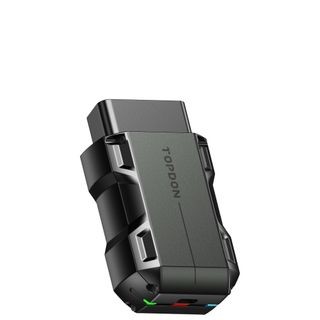 Topdon TopScan Mobile OBD2 Scanner
Topdon TopScan Mobile OBD2 Scanner
2.2. Launch CR529: Best Budget-Friendly Scanner
What makes the Launch CR529 the best car scanner for those on a budget? The Launch CR529 is an affordable yet powerful OBD-II scanner that offers essential features and lifetime updates. Its inexpensive price, lifetime updates, and easy pre-inspection report make it a fantastic value. As noted in a review by Tom’s Guide, the Launch CR529 provides a surprising level of diagnostic features for its low cost, including live data and an instant inspection feature.
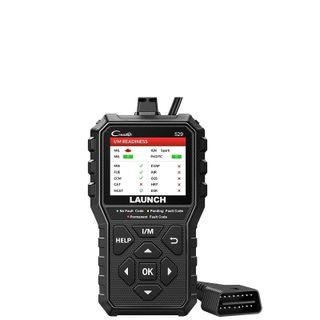 Launch CR529 OBD-II Scanner
Launch CR529 OBD-II Scanner
2.3. Topdon Phoenix Lite 2: Best Pro-Level Scanner
Why is the Topdon Phoenix Lite 2 recommended as the best pro-level car scanner? The Topdon Phoenix Lite 2 is designed for both amateur diagnosticians and professional mechanics, offering near-professional OBD scanning capabilities. Its features include a hybrid handheld with Wi-Fi and Bluetooth, an 8-inch touchscreen, and an excellent array of diagnostic tests and live data. According to Topdon’s official website, the Phoenix Lite 2 supports a wide range of vehicle makes and models and offers advanced features like ECU coding and programming.
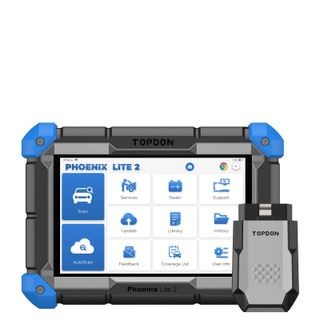 Topdon Phoenix Lite 2 OBD-II Scanner
Topdon Phoenix Lite 2 OBD-II Scanner
2.4. Ancel BD310: Best Dual-Purpose Scanner
What advantages does the Ancel BD310 offer as a dual-purpose car scanner? The Ancel BD310 can operate as a standard handheld scanner and connect to a smartphone via Bluetooth, turning into a secondary display for key engine details. Its light, compact design and dual functionality make it a handy tool. According to a review by Tom’s Guide, the BD310 is easy to keep around and offers both handheld and Bluetooth scanning capabilities.
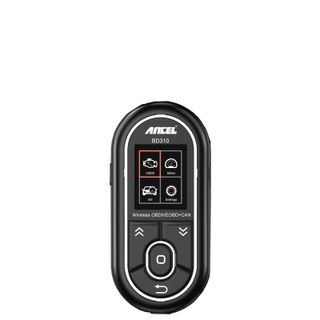 Ancel BD310 OBD-II Scanner
Ancel BD310 OBD-II Scanner
2.5. Carly OBD-II Scanner: Best Scanner with a Companion App
Why is the Carly OBD-II Scanner considered the best for its companion app? The Carly OBD-II Scanner stands out due to its high-quality companion app, which offers customization options and professional-level tests. It can fix lights, diagnose problems, provide repair help, and check used cars for issues. Carly’s official website highlights that the app is particularly beneficial for VW, BMW, and Ford cars, offering a range of customization options.
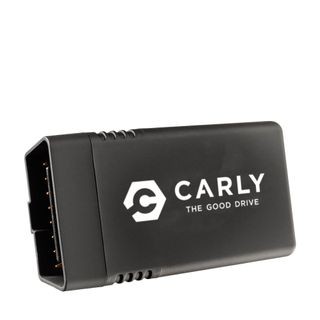 Carly OBD Scanner Grid Image
Carly OBD Scanner Grid Image
3. Detailed Reviews of the Top Car Scanners
3.1. Topdon TopScan Review
What are the key features and benefits of the Topdon TopScan car scanner? The Topdon TopScan offers excellent coverage of automotive diagnostics, live data, unique performance indicators, and maintenance item coverage. It’s a compact Bluetooth scanner that goes beyond basic fault finding.
| Feature | Description |
|---|---|
| Diagnostics | Comprehensive diagnostic capabilities for various vehicle systems. |
| Live Data | Real-time monitoring of essential parameters like engine speed, temperature, and voltage. |
| Performance Checks | Estimates horsepower and torque to fine-tune your car’s performance. |
| Maintenance | Covers essential maintenance items to ensure your car stays roadworthy. |
| Bluetooth | Connects wirelessly to your smartphone for convenient use. |
| Warranty | 2-year warranty |
Pros:
- Excellent diagnostic coverage
- Live data display
- Unique performance indicators
- Covers maintenance items
Cons:
- Transmitter is big and heavy
- Some features require subscription after a year
3.2. Launch CR529 Review
What makes the Launch CR529 a great value car scanner? The Launch CR529 provides essential diagnostic features at an affordable price, with lifetime updates and an easy pre-inspection report.
| Feature | Description |
|---|---|
| Display | 2.8-inch color display |
| I/M Readiness | Instant I/M readiness check for emissions testing. |
| Live Data | Displays live data streams. |
| Lifetime Updates | Free lifetime updates. |
| Support | Supports all OBD-II protocols and diagnostic functions. |
| Warranty | 1-year warranty |
Pros:
- Inexpensive
- Lifetime updates
- Easy pre-inspection report
Cons:
- Lacks manufacturer-specific codes
- Feels heavy in hand
- 1-year warranty
3.3. Topdon Phoenix Lite 2 Review
What advanced features does the Topdon Phoenix Lite 2 offer for professional car diagnostics? The Topdon Phoenix Lite 2 is a professional-grade scanner with wireless connectivity, an 8-inch touchscreen, and advanced diagnostic tests.
| Feature | Description |
|---|---|
| Display | 8-inch color touchscreen |
| Connectivity | Bluetooth and Wi-Fi for wireless connectivity |
| Diagnostics | Extensive diagnostic functions, including ECU coding and programming. |
| Live Data | Live data graphing and fault information. |
| Special Functions | Supports various special functions like oil reset, EPB reset, and more. |
| Warranty | 2-year warranty |
Pros:
- Near-professional OBD scanner
- Hybrid handheld with Wi-Fi and Bluetooth
- 8-inch touch screen
- Excellent array of diagnostic tests and live data
- Includes adapters and hard case
Cons:
- Big, heavy, and at times cumbersome
- Expensive
- After two years, requires a subscription
3.4. Ancel BD310 Review
How does the Ancel BD310 function as both a car scanner and a secondary display? The Ancel BD310 operates as a standard handheld scanner and can connect to a smartphone via Bluetooth, displaying key engine details.
| Feature | Description |
|---|---|
| Display | 2-inch color display |
| Connectivity | Bluetooth connectivity to smartphones |
| Functions | Standard OBD-II functions, including reading and clearing codes. |
| Live Data | Displays live data streams on both the scanner and connected smartphone. |
| Dual Purpose | Functions as a scanner and secondary car display. |
| Warranty | 3-year warranty |
Pros:
- Light and compact
- Works as scanner and secondary car display
- Offers handheld and Bluetooth scanning capabilities
Cons:
- Interface is too minimalist
- Screen is small
3.5. Carly OBD-II Scanner Review
What benefits does the Carly OBD-II Scanner’s companion app provide? The Carly OBD-II Scanner offers a high-quality companion app with customization options and professional-level tests, making it a versatile tool for car diagnostics.
| Feature | Description |
|---|---|
| Connectivity | Bluetooth connection to smartphones |
| App Features | Advanced diagnostic functions, coding, and customization options. |
| Vehicle Support | Optimized for VW, BMW, and Ford vehicles. |
| Additional Tests | Includes tests for battery health, used car checks, and more. |
| Warranty | Lifetime warranty |
Pros:
- Easy-to-use interface
- Customization options
- Live data display
- Maintenance and repairs covered
- Lifetime warranty and updates
Cons:
- Can’t do all tasks for all cars
- App can get expensive
4. Other Car Scanners We’ve Tested
4.1. Innova CarScan Mobile 1000
What makes the Innova CarScan Mobile 1000 an innovative car scanner option? The Innova CarScan Mobile 1000 is a Bluetooth OBD-II scanner with impressive features like predictive diagnosis, all running through your phone. Its simple setup process makes it an excellent Bluetooth-only option.
4.2. ThinkCar ThinkDiag TKD01
What unique features does the ThinkCar ThinkDiag TKD01 offer? The ThinkCar ThinkDiag TKD01 offers a wealth of manufacturer-specific error codes and extended fault codes that can fix minor errors. Despite its larger size, it’s highly durable.
4.3. Autel AutoLink AL539
What specific diagnostic capabilities does the Autel AutoLink AL539 provide? The Autel AutoLink AL539 is designed for diagnosing electrical problems, featuring a built-in multimeter. It can detect burnt cables, electric shorts, and busted fuses, along with a vast array of live data.
5. How to Choose the Best Scanner for Cars
What factors should you consider when selecting a car scanner? When choosing a car scanner, consider the following criteria:
- Easy Setup: A scanner that’s easy to set up ensures you can diagnose problems quickly.
- Faults and Explanations: The scanner should not only identify faults but also explain their meaning.
- I/M Readiness Check: A good scanner will run engine and emissions tests to check inspection readiness.
- Accuracy: Accurate results are crucial for effective diagnosis.
- Size and Weight: A compact and lightweight scanner is easier to handle and store.
- Live Data: The ability to monitor live data helps track down intermittent problems.
- Graphs: Visual representations of data are better for comparison and analysis.
- Warranty: A long warranty period ensures the scanner’s longevity.
5.1. Consider Your Needs
What are your specific diagnostic needs and how do they influence your choice of car scanner?
- DIY Enthusiast: Basic code reading and clearing capabilities might suffice.
- Professional Mechanic: Advanced features like live data, graphing, and manufacturer-specific codes are essential.
- Used Car Buyer: A scanner with pre-purchase inspection features can be invaluable.
5.2. Compatibility
How do you ensure the car scanner is compatible with your vehicle? Check the scanner’s compatibility list to ensure it supports your car’s make, model, and year. Most OBD-II scanners work with vehicles sold in the U.S. after 1996.
5.3. Features to Look For
What key features should you prioritize when selecting a car scanner?
- Code Reading and Clearing: Essential for diagnosing and resolving issues.
- Live Data Streaming: Provides real-time information about your vehicle’s performance.
- I/M Readiness Check: Helps ensure your car passes emissions testing.
- Manufacturer-Specific Codes: Provides more detailed diagnostic information for certain makes and models.
- Bi-Directional Control: Allows you to send commands to the vehicle to test specific components.
- Update Capability: Ensures your scanner remains current with new vehicle models and diagnostic protocols.
5.4. Budget Considerations
What is your budget for a car scanner and how does it influence your options? Car scanners range from basic, budget-friendly models to advanced, professional-grade tools. Set a budget and prioritize features based on your needs.
- Under $100: Basic code readers and entry-level scanners.
- $100 – $300: Mid-range scanners with live data and some advanced features.
- $300+: Professional-grade scanners with extensive features and capabilities.
6. Frequently Asked Questions (FAQs)
6.1. What is the OBD-II Port?
Where is the OBD-II port located in a car? The OBD-II port is the standard port on almost all passenger vehicles sold in the United States since 1996, in Canada since 1998, in the European Union since 2004, and in Australia, Mexico, and New Zealand since 2006. It’s typically located under the dashboard on the driver’s side.
6.2. What Does a DTC Mean?
How do you interpret a Diagnostic Trouble Code (DTC)? A DTC is an error code generated by the car’s OBD system when it detects an issue. Each code consists of five characters: a letter indicating the system (P, B, C, or U), a number indicating whether it’s a generic or manufacturer-specific code, and three additional characters specifying the exact fault.
6.3. Can a Car Scanner Fix Problems?
Can a car scanner be used to fix car problems directly? While a car scanner can identify problems, it cannot directly fix them. It provides diagnostic information that helps you understand the issue and determine the necessary repairs.
6.4. How Often Should I Use a Car Scanner?
How frequently should car owners use a car scanner to monitor their vehicle’s health? You should use a car scanner whenever you notice a warning light or suspect an issue with your vehicle. Regular checks can help catch minor problems before they escalate.
6.5. Are Wireless Scanners Secure?
What security measures should you consider when using a wireless car scanner? Ensure your wireless scanner uses a secure Bluetooth or Wi-Fi connection to protect your vehicle’s data. Keep the scanner’s software updated to patch any security vulnerabilities.
7. How We Test Car Scanners
7.1. Testing Methodology
What is the process for testing and evaluating car scanners? To test car scanners, we follow a comprehensive methodology:
- Initial Setup: Connect the scanner to a vehicle and verify it can read the VIN.
- Connectivity: Test wireless scanners with various devices (smartphones, tablets) via Bluetooth or Wi-Fi.
- Functionality: Monitor engine and vital systems while the car is running.
- Problem Simulation: Disconnect an engine component (e.g., oil temperature sensor) to generate an error code.
- Code Verification: Check the scanner’s accuracy in identifying the fault.
- Data Analysis: Evaluate the scanner’s ability to display live data in numbers, graphs, or gauges.
- Resolution: Fix the simulated problem, clear the check engine light, and erase the error code.
- Road Test: Drive the vehicle to assess the scanner’s performance under real-world conditions.
7.2. Key Evaluation Criteria
What are the main criteria used to evaluate the performance and usability of car scanners? We evaluate car scanners based on the following criteria:
- Accuracy: How accurately the scanner identifies and reports faults.
- Ease of Use: How easy it is to set up and use the scanner.
- Features: The range of features offered, such as live data, graphing, and special functions.
- Connectivity: The reliability of wireless connections.
- Durability: The scanner’s build quality and ability to withstand daily use.
- Value: The overall value provided for the price.
8. Maximizing the Benefits of Your Car Scanner with CAR-TOOL.EDU.VN
8.1. Detailed Product Information
How does CAR-TOOL.EDU.VN provide comprehensive information on car scanners? At CAR-TOOL.EDU.VN, we offer detailed specifications, in-depth reviews, and user feedback to help you make an informed decision. Our extensive database ensures you have all the information you need to select the best car scanner for your needs.
8.2. Comparison Tools
How can you compare different car scanners using CAR-TOOL.EDU.VN? Our comparison tools allow you to easily compare different models side-by-side, highlighting their features, pros, and cons. This simplifies the decision-making process and helps you find the perfect scanner.
8.3. Expert Recommendations
What expert advice does CAR-TOOL.EDU.VN offer for selecting and using car scanners? Our team of automotive experts provides recommendations and guides on selecting and using car scanners effectively. We offer tips on interpreting DTCs, performing diagnostics, and maintaining your vehicle.
8.4. Community Reviews and Ratings
How do community reviews and ratings contribute to your decision-making process on CAR-TOOL.EDU.VN? Our community reviews and ratings provide valuable insights from real users, helping you understand the real-world performance and reliability of different car scanners.
8.5. Latest Deals and Promotions
How can you find the best deals on car scanners through CAR-TOOL.EDU.VN? We constantly update our site with the latest deals and promotions from leading retailers, ensuring you get the best possible price on your car scanner purchase.
9. Actionable Steps to Enhance Your Car’s Performance
What immediate steps can you take to improve your car’s performance using a scanner?
- Regular Diagnostics: Use your car scanner regularly to identify potential issues early.
- Monitor Live Data: Keep an eye on live data streams to detect performance anomalies.
- Address DTCs Promptly: Investigate and resolve DTCs as soon as they appear.
- Follow Maintenance Recommendations: Adhere to the maintenance schedules recommended by your car’s manufacturer.
- Optimize Driving Habits: Use the information from your car scanner to adjust your driving habits for better fuel efficiency and performance.
10. Need Help Choosing the Right Scanner for Cars?
Are you struggling to find the perfect car scanner for your needs? At CAR-TOOL.EDU.VN, we understand the challenges of selecting the right automotive tools. That’s why we offer personalized support and expert advice to help you make the best choice.
Contact us today for a free consultation. Our team of experienced technicians is ready to answer your questions and guide you through the selection process. We can help you:
- Identify the right scanner based on your vehicle type and diagnostic needs.
- Compare different models and features to find the best fit for your budget.
- Understand the benefits of various scanner types, including handheld and wireless options.
Don’t wait until a minor issue becomes a major repair. Take control of your car’s health with the right car scanner from CAR-TOOL.EDU.VN.
Contact Information:
- Address: 456 Elm Street, Dallas, TX 75201, United States
- WhatsApp: +1 (641) 206-8880
- Website: CAR-TOOL.EDU.VN
CAR-TOOL.EDU.VN – Your trusted partner in automotive diagnostics and repair. Let us help you keep your vehicle running smoothly and efficiently.